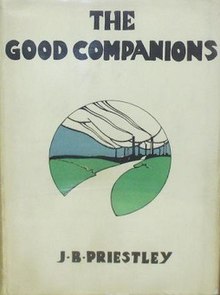The Good Companions

First edition
|
|
| Author | J. B. Priestley |
|---|---|
| Country | United Kingdom |
| Language | English |
| Publisher | William Heinemann Ltd |
|
Publication date
|
1929 |
| Media type | Print (hardback) |
| Followed by | Angel Pavement |
The Good Companions is a novel by the English author J. B. Priestley.
Written in 1929 (in Deal, Kent), it focuses on the trials and tribulations of a concert party in England between World War I and World War II. It is arguably Priestley's most famous novel, and the work which established him as a national figure. It won the James Tait Black Memorial Prize and was adapted twice into film.
The novel is written in picaresque style, and opens with the middle aged, discontented Jess Oakroyd in the fictional Yorkshire town of Bruddersford. He opts to leave his family and seek adventure "on t'road" (throughout the novel Priestley uses dialect for all non-RP speakers of English). He heads south down the Great North Road.
Intertwined with the story of Oakroyd's travels are those of Elizabeth Trant and Inigo Jollifant, two similarly malcontented individuals. Miss Trant is an upper-middle class spinster and Jollifant is a teacher at a down-at-heel private school. All three ultimately encounter each other when a failing concert troupe ('The Dinky Doos') are disbanding as a result of their manager's running off with the takings. The independently wealthy Miss Trant, against the advice of her relatives, decides to refloat the troupe, now known as 'The Good Companions'. Inigo plays piano, Oakroyd is the odd-job man, and other assorted characters including members of the original troupe: including Jimmy Nunn, Jerry Jerningham and Susie Dean, along with Mr Morton Mitcham (a travelling banjo player whom Inigo met earlier on his own odyssey) have various adventures round the shires of middle England.
After a sabotaged performance, the troupe disband: Jerry marries Lady Partlit, a fan; Susie and Inigo become successful and famous in London; Miss Trant gets married to a long lost sweetheart; Jess Oakroyd emigrates to Canada and the other performers carry on with their life on the road.
The Good Companions was an instant hit on publication, but was not particularly well regarded by critics. Despite this, it remained popular for over forty years. It then fell out of favour, not only because the novel was written from a (rather old fashioned) middle class perspective but also because it deals with a phenomenon (a travelling music hall troupe) which no longer exists.
...
Wikipedia
